
Old Doesn’t Equal Boring: Our Favorite Page-Turner Classics
Classic literature elicits a lot of complaints: “It’s boring!” “Nothing cool happens!” “None of that stuff has any bearing on my life!” “It’s so dry!” “Wait, she DIES? Why did I even read this?” “Could this symbolism be any more obvious?” “Did he seriously need 600 pages to say that?”
We’re not here to argue about any of that. No shoulds, no judgments, no finger-wagging, no shaming. We all like what we like, and yay for that.
And for that matter, we’re not here to argue about what constitutes a classic, whether we’re defining “classic” as old, new, cult, from the Western canon, or from any of the various schools that challenge the Western canon.
We’re here to talk about those moments in which Reading a Work of Classic Literature is simply Reading a Book—moments in which the baggage falls away, and we’re left with magic.
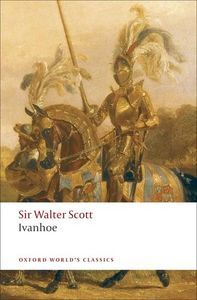 Leila Roy: This has happened to me quite a few times, but the one that really stands out was when I was assigned Sir Walter Scott’s Ivanhoe in college. About a third of the way in, I was already irrevocably hooked…and then the friends I was staying with decided to have an impromptu house party. And as they lived across the street from a liquor store, when they had house parties, THEY HAD HOUSE PARTIES.
Leila Roy: This has happened to me quite a few times, but the one that really stands out was when I was assigned Sir Walter Scott’s Ivanhoe in college. About a third of the way in, I was already irrevocably hooked…and then the friends I was staying with decided to have an impromptu house party. And as they lived across the street from a liquor store, when they had house parties, THEY HAD HOUSE PARTIES.
I tried to be social. I really did. But all I could think about was Rebecca and Brian de Bois-Guilbert and Locksley (let’s face it, Ivanhoe and Rowena are kind of the worst), and eventually, I managed to tiptoe into an empty bedroom with my book and read and read and read.
Actually, now that I think about it: I had to read Wilkie Collins’ The Moonstone for that same class, and at our first class after starting it, the professor asked if anyone had broken down and read the whole thing. I was the only one to raise my hand. When she asked me to explain, I just blurted, “I DON’T KNOW WHAT HAPPENED. I JUST NEEDED TO KNOW.” She grinned, said “NO SPOILERS,” and commenced with the first lecture.
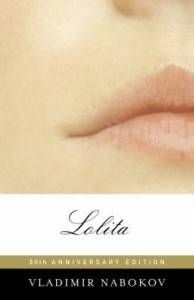 Jenn Northington: I have two of these moments!
Jenn Northington: I have two of these moments!
The first was when a high school friend (she was a junior, I was a sophomore) gave me Nabokov’s Lolita to read. She gave it to me before homeroom, and I spent that entire day walking from class to class with my nose stuck into the book. I definitely ran into more than a few people, and walked right past my locker only to have to double back. It wasn’t just that I wanted to know what was going to happen (although I did) — it was a revelation about the way language in books could work. I had never read sentences like Nabokov’s before, and I was spellbound.
The second was the family vacation during college that I spent reading and then immediately rereading Alexander Dumas’ The Count of Monte Cristo. Star-crossed love! Buckling of swashes! Prison! Betrayal! Revenge! Intrigue! Suicide! Disguises! Let’s not forget also the extreme amount of pathos. It was perfect: I was on a family vacation, so I felt unjustly imprisoned and thoroughly oppressed (even though it was an absolutely lovely vacation). I actually ran and hid at one point when our host family came to invite everyone on a hike; I didn’t want them to see me and force me to decline their invitation in person. I just wanted to sit in my room and read about poor, noble, beleaguered Dantes.
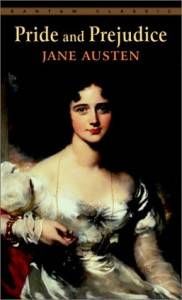 Rachel Manwill: The first classic-as-pageturner moment I can really distinctly remember happened during Spring Break of my freshman year of college. My parents and I were heading to Florida for my first-ever trip to Disney World (at the ripe old age of 18), and I was assigned Pride & Prejudice for an English class over the two week break. I decided that it would be good airplane reading for the trip down to Orlando, and it would be easy to set aside once we landed and shenanigans ensued. In the flight down (which isn’t that long), I tore through the first half of the book, and was unable to unbury my nose from it during the whole baggage claim/rental car/drive to the Disney hotel/checking in ordeal. (I think my mom was just guiding me by the elbow so I wouldn’t bump into things, by that point). After we deposited our suitcases in the room, it was still early evening, and my parents wanted to go out and explore the resort and get dinner. But I had 50 pages left. And I was NOT budging. So they left me in the room, flipping pages and rooting for Lizzie and Darcy so hard. When they came back to retrieve me for dinner, I’d finished it and was sobbing on the bed, clutching the book to my chest. I read it twice more during that trip.
Rachel Manwill: The first classic-as-pageturner moment I can really distinctly remember happened during Spring Break of my freshman year of college. My parents and I were heading to Florida for my first-ever trip to Disney World (at the ripe old age of 18), and I was assigned Pride & Prejudice for an English class over the two week break. I decided that it would be good airplane reading for the trip down to Orlando, and it would be easy to set aside once we landed and shenanigans ensued. In the flight down (which isn’t that long), I tore through the first half of the book, and was unable to unbury my nose from it during the whole baggage claim/rental car/drive to the Disney hotel/checking in ordeal. (I think my mom was just guiding me by the elbow so I wouldn’t bump into things, by that point). After we deposited our suitcases in the room, it was still early evening, and my parents wanted to go out and explore the resort and get dinner. But I had 50 pages left. And I was NOT budging. So they left me in the room, flipping pages and rooting for Lizzie and Darcy so hard. When they came back to retrieve me for dinner, I’d finished it and was sobbing on the bed, clutching the book to my chest. I read it twice more during that trip.
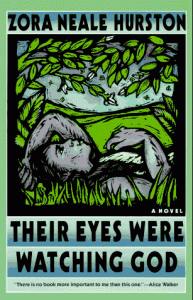 S. Zainab Williams: At the university I attended you could identify every English major on campus by the giant tome we carried around–the English Bible, we called it. This anthological behemoth brimmed with the ancient sawdust we call literary canon. So when a professor assigned Zora Neale Hurston’s Their Eyes Were Watching God, I consumed the novel like some parched word warrior. The prose was musical, the story so compelling, and I found myself paralyzed by curiosity about what had happened between Janie and Tea Cake. I set everything aside for this book and kept my copy long after I had burned (read sold–I was a starving student after all) that English Bible.
S. Zainab Williams: At the university I attended you could identify every English major on campus by the giant tome we carried around–the English Bible, we called it. This anthological behemoth brimmed with the ancient sawdust we call literary canon. So when a professor assigned Zora Neale Hurston’s Their Eyes Were Watching God, I consumed the novel like some parched word warrior. The prose was musical, the story so compelling, and I found myself paralyzed by curiosity about what had happened between Janie and Tea Cake. I set everything aside for this book and kept my copy long after I had burned (read sold–I was a starving student after all) that English Bible.
Jessica Woodbury: I’ve had a lot of these experiences but the one that sticks out most in my head was in a college English class, Brit Lit 1890 to 1950. The book was The Good Soldier by Ford Madox Ford. I’d never heard of the book or the author. I knew only that we were in the midst of WWI literature and I was getting bored. If you’ve read the novel you know that the title is completely inaccurate (it’s not about soldiers or war at all) and after weeks of poetry about boys dying on battlefields what I really needed was a melodrama about adultery with an unreliable narrator. I read that book in one sitting, in the living room of my apartment. I’m sure my roommates came and went. At some point I must have gotten up to eat. But mostly I couldn’t stop reading and I went to our next class so excited I could barely contain myself.
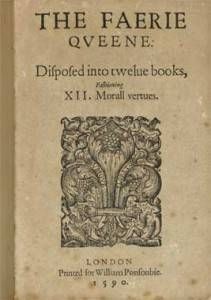 Troy Wiggins: I was assigned Edmund Spenser’s The Faerie Queene for an Early period British Literature course in college. I’d spent a lot of time groaning about having to take British Literature as a required course, and was really yearning to get to the upper-level literature courses that featured a lot more author diversity. Because I spent most of my time in the class sulking (I even sulked through Chaucer!), I wasn’t prepared for the awesomeness that was The Faerie Queene.
Troy Wiggins: I was assigned Edmund Spenser’s The Faerie Queene for an Early period British Literature course in college. I’d spent a lot of time groaning about having to take British Literature as a required course, and was really yearning to get to the upper-level literature courses that featured a lot more author diversity. Because I spent most of my time in the class sulking (I even sulked through Chaucer!), I wasn’t prepared for the awesomeness that was The Faerie Queene.
If I’m honest, I got tricked. The Faerie Queene seems like a regular adventure story, told in verse with a lot of extra e’s on the ends of words. The main story featured knights, dragons, and evil wizards, and I am all about knights, dragons, and evil wizards. I distinctly remember going to our campus arcade, parking myself in front of one of the lesser-used cabinets, and devouring the poem, stopping often to try and decipher an obscure reference or an Middle English word whose meaning escaped me.
As I got deeper into the work, I discovered that the adventure story was a deep and compelling allegory that examined the sixteenth century England’s political climate, religious changes, and historical figures. I had never harbored an interest in any of those things before, but as I tore through The Faerie Queene, I found myself questing to uncover more information about relevant events, people, and ideas. Needless to say, I aced the Faerie Queene version of our final exam, and I still consider it one of the most interesting works of classic literature that I’ve ever encountered.
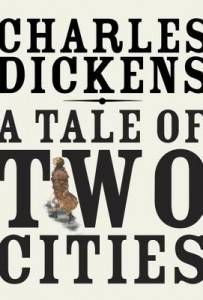 Karina Glaser: When I came to NYC for college, one of my first stops was The Strand Bookstore. Like most college students, I had no money. I eyed all those beautiful new hardcovers for hours before heading toward the exit. On my way out, there was a shelf of old classics, all published in 1950, and only $5 each. I picked up a frayed copy of A Tale of Two Cities by Charles Dickens and flipped through it. It became my first non-college-related book purchase.
Karina Glaser: When I came to NYC for college, one of my first stops was The Strand Bookstore. Like most college students, I had no money. I eyed all those beautiful new hardcovers for hours before heading toward the exit. On my way out, there was a shelf of old classics, all published in 1950, and only $5 each. I picked up a frayed copy of A Tale of Two Cities by Charles Dickens and flipped through it. It became my first non-college-related book purchase.
All through college the book sat on my shelf like a badge of honor. People who came by my dorm room would pick it up, say, “Wow, A Tale of Two Cities. Cool.” I never read it during those college years, but it traveled with me from dorm to dorm until it ended up in my first apartment, a sun-filled, roach-infested abode with a regal tree that reached all the way up to my fifth floor window.
It was in that first apartment that I finally read A Tale of Two Cities. I couldn’t stop reading it. The language was so gorgeous and the story so heartbreaking that I wondered why I had never read it earlier. But I think with some classics, they get better with age and with time. I’m looking forward to rereading this again soon and discovering more of its mysteries.
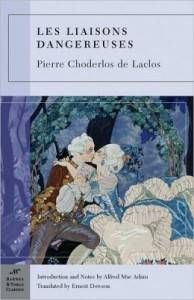 Kristel Autencio: I’ve read (or attempted to read) works that are considered classics, and while I’ve enjoyed many of them, getting used to the language will probably always challenge me. That said, there have been a lot of brilliant surprises. For one college semester, I was in two simultaneous classes that covered Shakespeare, as well as his contemporaries like Ben Jonson, John Webster, and Christopher Marlowe. The classes were both conducted by a brilliant professor, who for a time also worked as a Shakespearean actress. The plays that we tackled were revelatory. Some of them have been obscured by time, but there is a lot of high drama and intrigue in Tudor plays which I found truly bracing. The class also taught us some of the dirty jokes in the text that people gloss over, because Shakespeare and company are supposed to be Serious Literary Giants.
Kristel Autencio: I’ve read (or attempted to read) works that are considered classics, and while I’ve enjoyed many of them, getting used to the language will probably always challenge me. That said, there have been a lot of brilliant surprises. For one college semester, I was in two simultaneous classes that covered Shakespeare, as well as his contemporaries like Ben Jonson, John Webster, and Christopher Marlowe. The classes were both conducted by a brilliant professor, who for a time also worked as a Shakespearean actress. The plays that we tackled were revelatory. Some of them have been obscured by time, but there is a lot of high drama and intrigue in Tudor plays which I found truly bracing. The class also taught us some of the dirty jokes in the text that people gloss over, because Shakespeare and company are supposed to be Serious Literary Giants.
Another surprise for me was Choderlos de Laclos’ Les Liaisons Dangereuses. The copy that I took down from the library had this rococo painting of a woman in a voluminous gown, frolicking on a swing. I thought it was going to be a pastoral and boring book that I just have to get through in order to feel “well-read.” What I ended up reading is a blistering epistolary novel about two irredeemable aristocrats who plotted to ruin a young girl for sport. As I was racing to finish the book in one day I kept thinking to myself: “This was written in the 1700s?!”
What about you? What classic works have kept you especially riveted?





